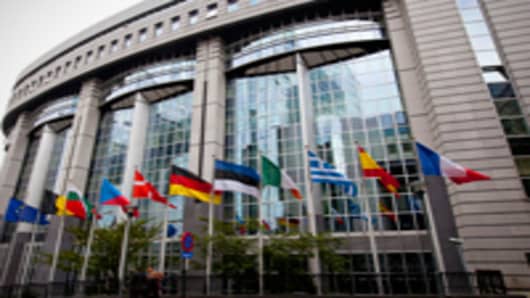The latest proposal aimed at amping up the European bailout found has "Made in Washington" stamped all over it, according to one economist.
Stephen Lewis, chief economist at Monument Securities, said that with rich European Union governments like Germany unable to sell their voters on the idea of more bailout funds for Greece or the banks, the latest proposal to use leverage to increase the European Financial Stability Fund has a distinctly American ring to it.
“If it is accepted that massive expansion of the EFSF through contributions by member-states is a non-starter on account of the near-impossibility of gaining parliamentary approval for such an approach, then the EFSF would need to have recourse to leverage,” Lewis said in a research note.
On Monday CNBC reported that EU officials are considering providing seed money for a special purpose vehicle that would be able to issue bonds and buy up euro zone sovereign debt.
Sources told CNBC of as much as an 8-to-1 leverage ratio, depending on how much capital comes from the EFSF.
“It is because (the Americans) do not recognize the limits of what may be politically possible in Europe, that they consistently underestimate the seriousness of the euro threat to global stability,” Lewis said.
“Even now, they seem to believe that introducing more leverage into the euro-based financial system will solve the severe problems of zone-wide economic imbalance that have developed under the toxic euro regime.” Believing a finite fund, however large, will simply stave off catastrophe for a while, Lewis believes the only real solution to the crisis is a European —rather than an American — solution.
“If the euro is to be defused as a source of global economic disruption, it will only be if the zone’s member-states are willing to afford each other open-ended fiscal support,” he said.
Such an outcome is highly controversial in Europe and seen by many as fiscal union via the backdoor.
“US policymakers, who are so loud in their support of democratic rights in other parts of the world, might find they have to make an exception for the euro zone, if they are to preserve a semblance of order in the Western financial system.” Lewis said.
Plans for levering the EFSF are already well advanced, sources said.
How the EFSF is leveraged higher is likely to be hotly debated in the coming days, and Lewis worries about the legal ramifications of the European Central Bank lending to the EFSF in order to by-pass national governments and voters, given the quasi-fiscal role the central bank would then play.
“To suppose that these matters will be ironed out in time for the G20 meeting in Cannes is, to say the least, highly optimistic,” said Lewis, adding that by the time it is agreed upon, it could already be overtaken by events.
“Even if the ratification of this package is completed, which seems highly likely though not a foregone conclusion, it is liable now to appear as ‘too little, too late,’” he said.
Officials in the United States have become increasingly frustrated with the EU as the debt crisis has rumbled on, but Lewis believes this is due to a lack of understanding of the practicalities facing EU lawmakers.



